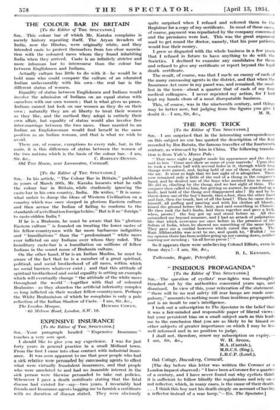[To the Editor of THE SPECTATOR.] SIR, — In his article, "The
Colour Bar in Britain," published in yours of March 38th, Mr. Karaka laments what he calls the colour bar in Britain, While studiously ignoring the caste-bar in his own country, India. He writes, "It is some- what unfair to dump the ideas of Western Civilization on a country which was once steeped in glorious Eastern culture and then accuse the Indian of failing to conform to the standards of a civilization foreign to him." But is it so" foreign" to caste-ridden India ?
If he is a Brahmin, he must be aware that his "glorious Eastern culture" is founded on treating the lower castes of his fellow-countrymen with far more barbarous indignities and " humiliations " than the " predominant " white races ever inflicted on any Indians over whom they ruled. The hereditary caste-bar is a humiliation on millions of fellow Indians in the sound name of Brahmin culture.
On the other hand, if he is an Indian Muslim, he must be aware of the fact that he is a member of a great spiritual, political, and social brotherhood of all races, within which no social barriers whatever exist ; and that this attitude of spiritual brotherhood and social equality is setting an example which will eventually change "the attitude of the white races throughout the world "—together with that of coloured Brahmins—as they abandon the artificial inferiority complex so long inflicted on their weaker fellow-countrymen. Perhaps the White Brahminism of which he complains is only a pale reflection of the Indian Shadow of Caste.—! am, Sir, Sze.,
















































 Previous page
Previous page